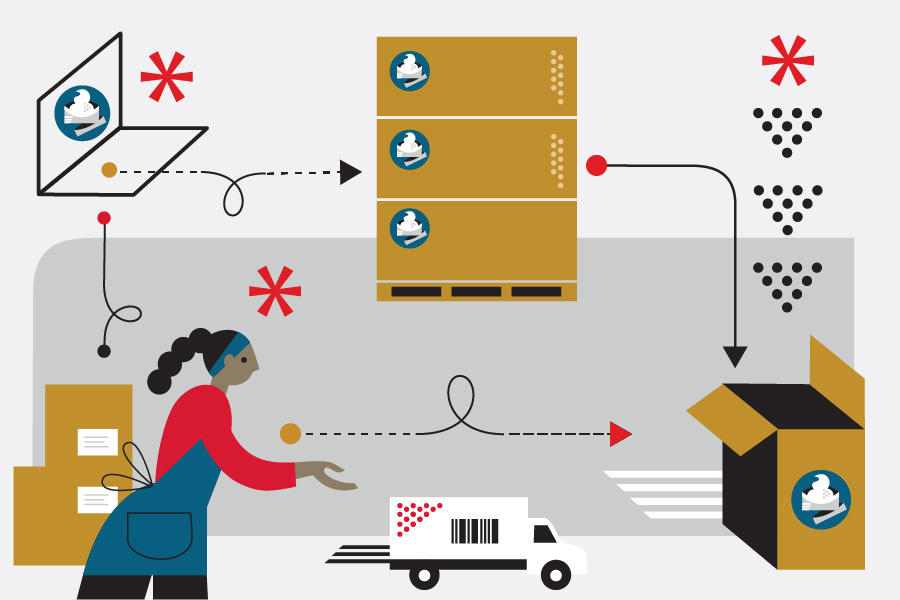Logistics
Industries
Technology & Innovations
E-commerce
E-commerce Fulfillment Services
Lease & Maintenance
Semi Trucks
Logistics
E-commerce
Lease & Maintenance
Buy Used Trucks

Behind the seamless online shopping experience lies a complex process known as e-commerce fulfillment. This process involves various logistical functions, including order processing, inventory management, warehousing, shipping, and delivery. Understanding and optimizing e-commerce fulfillment with integrated logistics is crucial for businesses to thrive in the competitive online marketplace.
Understanding Integrated Logistics in E-commerce Fulfillment
Integrated logistics refers to the seamless coordination of various logistical functions to ensure efficient and timely order fulfillment in e-commerce operations. It involves the integration of systems, processes, and technologies to streamline the flow of goods from the point of order placement to delivery. Integrated logistics encompasses inventory management, order processing, warehousing, transportation, and distribution, all working together to meet customer demands effectively.
The E-commerce Fulfillment Process: A Breakdown
The e-commerce fulfillment process begins when a customer places an order on the online platform. Upon receiving the order, the online retailer initiates the fulfillment process by retrieving the products from their inventory or warehouse. These products are then picked, packed, and labeled in preparation for shipment. Once packaged, the items are handed over to a shipping carrier for delivery to the customer's specified address. Throughout this process, effective coordination and communication are essential to ensure smooth and efficient order fulfillment.
The Significance of Optimized E-commerce Fulfillment
Optimizing e-commerce fulfillment with integrated logistics offers numerous benefits for businesses, including enhanced customer satisfaction, improved operational efficiency, and increased profitability. By investing in integrated logistics solutions, businesses can streamline their fulfillment processes, minimize errors, and deliver a superior customer experience. Furthermore, optimized fulfillment enables businesses to adapt to changing market demands and stay competitive in the dynamic e-commerce landscape.
Common Challenges and Solutions in E-commerce Fulfillment
Despite its importance, e-commerce fulfillment poses several challenges that businesses must address to ensure success. Some of the common challenges include managing peak season demands, inventory shortages, data security concerns, and quality control issues. To overcome these challenges, businesses can implement strategic solutions such as proactive inventory management, robust cybersecurity measures, and rigorous quality control processes. By addressing these challenges proactively, businesses can optimize their fulfillment operations and drive long-term success.
Strategies for Optimizing E-commerce Fulfillment with Integrated Logistics
To optimize e-commerce fulfillment with integrated logistics, businesses can implement various strategies tailored to their unique needs and challenges. These strategies include:
Streamline Inventory Management: Utilize real-time visibility and data analytics to optimize inventory levels, forecast demand accurately, and minimize stockouts.
Automate Order Processing: Invest in automation solutions to expedite order processing, reduce errors, and improve efficiency in fulfillment operations.
Optimize Warehouse Layout: Design an efficient warehouse layout to streamline order picking, packing, and shipping processes, thereby improving productivity and reducing fulfillment times.
Explore Integrations: Integrate e-commerce platforms, shipping providers, CRM systems, and other tools to streamline operations, enhance visibility, and improve the overall customer experience.
Simplify Returns Management: Implement user-friendly returns processes, integrate returns systems with customer support tools, and automate return authorization to enhance customer satisfaction and streamline operations.
Enhance Shipping Processes: Select reliable shipping carriers, offer flexible delivery options, optimize packaging, and provide real-time tracking to improve the shipping experience for customers and reduce transit times.
Optimizing e-commerce fulfillment with integrated logistics is essential for businesses to succeed in the competitive online marketplace. By understanding the intricacies of e-commerce fulfillment, addressing common challenges, and implementing strategic solutions, businesses can enhance customer satisfaction, drive operational efficiency, and achieve sustainable growth. With the right approach to integrated logistics, businesses can unlock new opportunities and stay ahead of the curve in the dynamic world of e-commerce.